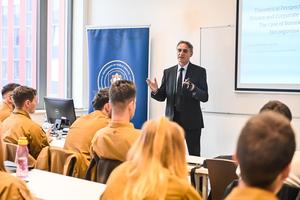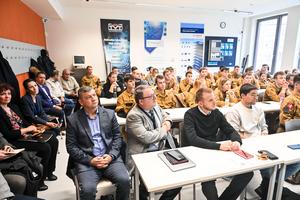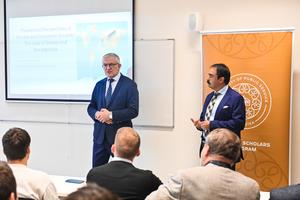Associate Professor Velibor Lalić, the Head of the Department of Security Sciences at the Faculty of Security Sciences, University of Banja Luka, Bosnia and Herzegovina, spent quite a busy week with the citizens of Ludovika.
The guest is a prominent security studies expert, a researcher at the European Centre for Defence Studies, co-editor of the Journal for Security and Criminalistics and a registered security expert with the Organisation for Security Cooperation in Europe (OSCE).
His lecture "Theoretical Perspectives of Private and Corporate Security: the Case of Bosnia and Herzegovina" was attended by lecturers from the Department of Private Security and Municipal Policing, students of the courses in Private Security, national experts in corporate and private security, and law enforcement practitioners from various fields.
The participants were welcomed by Ambassador Iván Gyurcsik, Director of the Ludovika Scholars Program, and Levente Tóth, Acting Head of the Department of Private Security and Municipal Law Enforcement. In his lecture, the guest professor analysed the organisations providing private security, such as private security services, private investigators, private military companies and private intelligence and intelligence analyst services. In the field of corporate security, he distinguished between physical access control methods, security solutions using technical means, information security tasks and security incident investigation. He proposed a method of comparative analysis and outlined a typology for this distinction. He also examined the historical background of the security environment in Bosnia and Herzegovina today. The destruction of infrastructure and economic damage during the 1992-1995 war period pose significant challenges even for present security responders. Public and private policing, regulated differently in the three entities of our regional neighbour country, raises multiple cooperation issues. Organisations with complex structures, state law enforcement agencies with local and federal jurisdiction, and some 70 private security companies must perform their tasks in a complex environment. Finally, he analysed these companies and presented the private security market and the significant changes that have happened there.
At the working group meeting on "The role of private/corporate security in emergency situations - Challenges of crisis management", the group of attendants mentioned above of university students and lecturers was joined by Major General Gábor Kovács, Dean of the Faculty of Civil Engineering, students of the Szent György College and experts in fire protection engineering and industrial security from the Institute of Disaster Management.
The session focused on solving five different crisis situations, which were carried out independently by small working groups according to the guidelines provided. Spokespersons of each group presented their solutions to the audience. These were then jointly evaluated by the participants, thus helping to interpret the challenges in the scenarios from multiple angles and to identify and solve potential shortcomings.
Feedback from teachers and students alike indicated that the session was very successful in learning professional content and developing creativity and language skills.
The visiting professor had an insight into the fundamental organisational principles of Hungarian law enforcement higher education and the details of the teaching and scientific research portfolio at Ludovika. The visit also provided an opportunity to review the possibilities of editorial cooperation between the Journal of Security and Criminal Sciences (https://fbn.unibl.org/en/journal/) in Bosnia and Herzegovina and the scientific journal Hungarian Law Enforcement (https://folyoirat.ludovika.hu/index.php/magyrend). During the one-week visit, several professional and academic meetings were held, anticipating further opportunities for cooperation between the universities.
Text by Zágon Csaba, József Deák
Photo by Dénes Szilágyi


